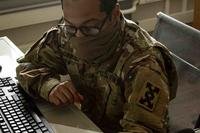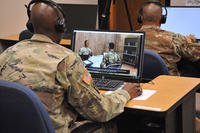Attending school online has come a long way. Not too long ago, online classes only had the basic necessities required to pass a class: assignment list, announcements and drop box for completed work.
Today, online classrooms might not differ as much from a traditional education as you might think. A main difference between online and traditional schooling can be the element of flexibility. You can customize your schedule to suit your lifestyle. This is particularly important for military families who deal with deployments, frequent moving and transitioning out of service. In fact, the flexibility afforded from online universities has given many service members and their spouses the opportunity to complete their education.
So what exactly is it like to be an online student? The first few months of an undergraduate degree program can be an overwhelming experience, especially for military spouses. Some of the typical questions many military spouses ask are:
- What should my major be?
- What is my plan after graduation?
- How am I going to fund my education?
- How will I fit school and work into my schedule?
Luckily, online institutions have a variety of resources and services, such as orientations, events and clubs, to guide you through your questions and concerns.
Many online schools also have specially trained military advisors to help take the anxiety and stress out of going back to school. Advisors follow a simplified process with all students in order to get them ready for the start of their classes.
The first step is an interview with an Admissions Advisor to understand your current interests and future goals in order to help you with a customized program recommendation. Once a program has been chosen the advisor will walk you through applying. After you're enrolled, you and your advisor work together to prepare for your first classes, which include the following activities:
- Scheduling a time to attend orientation
- Working to have transfer credits evaluated
- Giving you a tour of the virtual campus
- Acting as a liaison between you and a Military Educational Benefits Specialist to complete your financial aid plan
- Encourage engagement in online events to meet your peers
- Discuss your eligibility and participation in exams in order to test out of classes
I look back at my educational experiences and wonder if my degree choice would have been different if I had someone to guide me through the process before classes started. Would I have been more involved in peer activities without being intimidated? There's a lot to be said about the experience of online education compared to traditional education. In the end, you have to choose what fits best with your lifestyle and what will make you a successful student.
Eva Mitchell is the National Director of Admission at Colorado Technical University (CTU).





















